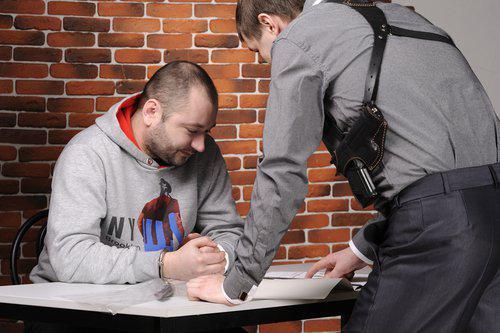Recent Blog Posts
Social Media, Oversharing, and the Risk of Criminal Charges
 For many people, social media is a place to connect with friends, family, or even businesses; however it can also be a tool for police, prosecuting attorneys, and other legal officials to use as they see fit. As a result, anyone who shares illegal activity — be it alleged animal abuse, child abuse, rape, kidnapping, or murder — may find themselves in jail facing criminal charges.
Woman Faces Charges of Animal Abuse after Posting Photos on Facebook
In December of last year, a North Carolina woman allegedly posted a photo on Facebook of a dog with its mouth taped shut. Shared approximately 400,000 times on the popular social media site, several users called for an investigation into the matter. When local officers responded, they allegedly found no sign of injury and dogs that appeared to be cared for, but the woman was still arrested on charges for cruelty to animals.
Facebook Video Leads to DUI Arrest
While driving down the road, an Ohio man allegedly took a cellphone video of himself drinking from a partially concealed bottle. Just hours later, the man found himself in police custody. With a copy of his 12-second video in the hands of the police, he faced five misdemeanor charges, including operating a vehicle under the influence of alcohol or drugs and possessing an open container in a vehicle.
Yik Yak Willingly Hands Data Over to Law Officials
While not all social media platforms will openly admit that they provide information to law officials, the platform Yik Yak has no qualms about being open with its data. Recently, Yik Yak (and other witnesses) reached out to Oneonta City officials after young college student allegedly posted a mass shooting threat. Though the message was soon deleted, the individual now faces charges for making a terrorist threat (a Class D felony), and second-degree aggravated harassment (Class A misdemeanor).
Social Media Used in Pending Criminal Cases
Anything that is not set as “private” on your social media accounts may be fully accessible to members of the public and admissible in court. Even if you only share the information with a select group of people, it is possible to find that a recent status update or photo is being submitted as evidence. Bottom line: do not share potentially incriminating evidence on social media. Even better, do not discuss your pending criminal case with anyone other than your attorney — and that includes on social media.
If you need aggressive and competent representation after an arrest, the skilled Milwaukee criminal defense attorneys at Gimbel, Reilly, Guerin & Brown, LLP, can help. With more than 250 years of combined experience, our attorneys know what it takes to build a solid defense. Learn more by calling 414-271-1440 to schedule your consultation today.
For many people, social media is a place to connect with friends, family, or even businesses; however it can also be a tool for police, prosecuting attorneys, and other legal officials to use as they see fit. As a result, anyone who shares illegal activity — be it alleged animal abuse, child abuse, rape, kidnapping, or murder — may find themselves in jail facing criminal charges.
Woman Faces Charges of Animal Abuse after Posting Photos on Facebook
In December of last year, a North Carolina woman allegedly posted a photo on Facebook of a dog with its mouth taped shut. Shared approximately 400,000 times on the popular social media site, several users called for an investigation into the matter. When local officers responded, they allegedly found no sign of injury and dogs that appeared to be cared for, but the woman was still arrested on charges for cruelty to animals.
Facebook Video Leads to DUI Arrest
While driving down the road, an Ohio man allegedly took a cellphone video of himself drinking from a partially concealed bottle. Just hours later, the man found himself in police custody. With a copy of his 12-second video in the hands of the police, he faced five misdemeanor charges, including operating a vehicle under the influence of alcohol or drugs and possessing an open container in a vehicle.
Yik Yak Willingly Hands Data Over to Law Officials
While not all social media platforms will openly admit that they provide information to law officials, the platform Yik Yak has no qualms about being open with its data. Recently, Yik Yak (and other witnesses) reached out to Oneonta City officials after young college student allegedly posted a mass shooting threat. Though the message was soon deleted, the individual now faces charges for making a terrorist threat (a Class D felony), and second-degree aggravated harassment (Class A misdemeanor).
Social Media Used in Pending Criminal Cases
Anything that is not set as “private” on your social media accounts may be fully accessible to members of the public and admissible in court. Even if you only share the information with a select group of people, it is possible to find that a recent status update or photo is being submitted as evidence. Bottom line: do not share potentially incriminating evidence on social media. Even better, do not discuss your pending criminal case with anyone other than your attorney — and that includes on social media.
If you need aggressive and competent representation after an arrest, the skilled Milwaukee criminal defense attorneys at Gimbel, Reilly, Guerin & Brown, LLP, can help. With more than 250 years of combined experience, our attorneys know what it takes to build a solid defense. Learn more by calling 414-271-1440 to schedule your consultation today.
Sources:
New Bill Takes Aim at Law Enforcement’s Ungoverned Access to Technology-Related Data
 Technology has made many advances over the past decade. In most cases, those advances have improved or enriched our lives in some way. There is, however, a negative aspect: laws have been unable to keep up with rapid advancements in technology and has left them, for the most part, ungoverned. A new bill, proposed by Representative Dave Craig and Senator Van Wanggaard, hopes to change that. The new bill could change how law officials are allowed to bring criminal charges against Wisconsin citizens. The bill would create a legislative committee that would have oversight of secret investigative technologies and techniques.
The Blurring Lines of Privacy
In the face of advancing technology, the lines of privacy have begun to blur. Law enforcement can charge individuals based on posts made to social media. DNA is often stored in national databases, even after a person is released of charges. GPS is sometimes used to track the location of a cell phone and place an individual at or near the scene of a crime. And advanced equipment can “trick” cellphones into revealing private and personal information, including text messages and call histories.
These newer, more advanced crime-fighting technologies are being obtained and used at a rate nearly consistent with the advancement of technology itself.
New Bill Pushes Back
If passed, the new bill would require that officials notify the legislative committee if there are plans to purchase or utilize a new service or technology. Legislators would have the power to subpoena information on any technology currently used or employed. Other provisions of the bill include creating legislative authority to investigate all facets of a John Doe investigation upon its conclusion, and require committee notification prior to any law enforcement agency’s receipt of new weapons, armaments, and equipment.
Charged with a Crime? Know Your Rights and Hire a Skilled Defense Attorney
When facing criminal charges, it is crucial that you understand your rights, and that you employ the assistance of a skilled and experienced criminal defense attorney. Gimbel, Reilly, Guerin & Brown, LLP, can help. Prepared to go the extra mile to ensure your rights are protected, our skilled and experienced Milwaukee criminal defense attorneys can provide you with aggressive and personalized representation you deserve. Schedule your consultation by calling 414-271-1440 today.
Technology has made many advances over the past decade. In most cases, those advances have improved or enriched our lives in some way. There is, however, a negative aspect: laws have been unable to keep up with rapid advancements in technology and has left them, for the most part, ungoverned. A new bill, proposed by Representative Dave Craig and Senator Van Wanggaard, hopes to change that. The new bill could change how law officials are allowed to bring criminal charges against Wisconsin citizens. The bill would create a legislative committee that would have oversight of secret investigative technologies and techniques.
The Blurring Lines of Privacy
In the face of advancing technology, the lines of privacy have begun to blur. Law enforcement can charge individuals based on posts made to social media. DNA is often stored in national databases, even after a person is released of charges. GPS is sometimes used to track the location of a cell phone and place an individual at or near the scene of a crime. And advanced equipment can “trick” cellphones into revealing private and personal information, including text messages and call histories.
These newer, more advanced crime-fighting technologies are being obtained and used at a rate nearly consistent with the advancement of technology itself.
New Bill Pushes Back
If passed, the new bill would require that officials notify the legislative committee if there are plans to purchase or utilize a new service or technology. Legislators would have the power to subpoena information on any technology currently used or employed. Other provisions of the bill include creating legislative authority to investigate all facets of a John Doe investigation upon its conclusion, and require committee notification prior to any law enforcement agency’s receipt of new weapons, armaments, and equipment.
Charged with a Crime? Know Your Rights and Hire a Skilled Defense Attorney
When facing criminal charges, it is crucial that you understand your rights, and that you employ the assistance of a skilled and experienced criminal defense attorney. Gimbel, Reilly, Guerin & Brown, LLP, can help. Prepared to go the extra mile to ensure your rights are protected, our skilled and experienced Milwaukee criminal defense attorneys can provide you with aggressive and personalized representation you deserve. Schedule your consultation by calling 414-271-1440 today.
Source:
Analysis Suggests Wisconsin May be Worst State for Racial Disparity and Oppression
Minority oppression and disparity has always been an issue in America, but its continuance (and the resulting effects) are more prevalent in certain areas of the country. After reviewing major studies published over the last few years, analysts believe that Wisconsin may be the worst in the nation for racial disparity. This translates into a number of disadvantages for the state’s minorities, including an increased risk for wrongful arrests and convictions. Appleton Arrest Rates Outweigh Ferguson’s The racial disparity and injustice in Ferguson, Missouri have been the target of media spotlights for some time now, and for good reason: in Ferguson, black arrests outweigh white arrests at a ratio of three to one. However, a review of recent arrest statistics in Appleton, WI found an even greater disparity. There, African American residents make up only four percent of the total population, yet they are subject to nearly 60 percent of all arrests. An examination of the state prison’s records revealed similarly disturbing disparities for African Americans. Over half of all Milwaukee County African American men in their early 30s and 40s have been incarcerated at some point in their lives, and a 2014 study found that one in eight African American men in Wisconsin are currently incarcerated. These statistics far exceed those found in other states by a startling and significant margin. Poverty, Joblessness, Other Areas of Oppression Perpetuate the Issue Most economists will agree that justice disparity goes hand-in-hand with poverty and other areas of oppression, such as difficulty finding employment. Sadly, these issues were found to be far worse for African Americans in Wisconsin than in other states, the analysis found. In Milwaukee, where the overall poverty rate is just eight percent, 36 percent of all African Americans are impoverished. And in Madison, the overall poverty rate for African American families is even worse—over 50 percent. Facing Criminal Charges or Wrongfully Arrested? Get Experienced and Aggressive Help Although the recently released information suggests there is little hope for improving the social injustices for minorities of Wisconsin, there are people willing to stand up for social equality. The attorneys of Gimbel, Reilly, Guerin & Brown, LLP have more than 40 years of experience in protecting the rights of residents in the Milwaukee, Madison, Green Bay, and Waukesha areas. Inquire as to how our Milwaukee criminal defense attorneys may be able to help with your case by calling 414-271-1440 to schedule your consultation today.Source:
Changes to Wisconsin’s Sexual Assault Laws Could Be on the Way
 Current law defines sexual assault (at minimum) as any intentional, non-consensual sexual touching of intimate parts, directly or through clothing, for the purpose of sexual gratification or victim humiliation. Some lawmakers are looking to make changes to that law that would greatly alter the definition of touching. It would also further restrict who is allowed to give consent in any given situation.
Current law defines sexual assault (at minimum) as any intentional, non-consensual sexual touching of intimate parts, directly or through clothing, for the purpose of sexual gratification or victim humiliation. Some lawmakers are looking to make changes to that law that would greatly alter the definition of touching. It would also further restrict who is allowed to give consent in any given situation.
In tandem to those proposed changes, lawmakers in Wisconsin recently introduced a new bill that is designed to provide protections to underage assault victims. Both measures are intended to mostly target college campus and high school sexual assault crimes, but the implications have a much wider net with a penalty that could impose charges, even if no intent exists.
Affirmative Consent, Touching, and the Physically Disabled
How Often Do Wrongful Arrests, Convictions, and Imprisonment Occur?
 While most of us would like to believe that wrongful convictions are rare, the real truth is that they are more common than most people realize. Steven Avery, who spent 18 years in jail for a rape he did not commit, and a San Francisco man who spent six years in jail while awaiting trial for a violent mugging that he never did are just two people wronged by our justice system. But they are many. They are also largely unpublicized and undisclosed to the general public.
While most of us would like to believe that wrongful convictions are rare, the real truth is that they are more common than most people realize. Steven Avery, who spent 18 years in jail for a rape he did not commit, and a San Francisco man who spent six years in jail while awaiting trial for a violent mugging that he never did are just two people wronged by our justice system. But they are many. They are also largely unpublicized and undisclosed to the general public.
Study Estimates More than 10,000 Innocent People Are Convicted Each Year
A recent study asked 188 judges, state attorneys general, prosecuting attorneys, public defenders, police chiefs, and sheriffs to estimate the prevalence of wrongful conviction in the United States. Approximately 72 percent of them estimated that less than one percent, but more than zero, received a wrongful conviction.
Understanding the Implications of a Hate Crime
 Hate crimes are criminal acts committed because of someone’s race, religion, ethnicity, sexual orientation, gender, gender identity, or disability. Charged and tried according to state statutes, most carry a “penalty enhancement” clause that increases the weight of a penalty. The federal government may also become involved in the investigation or prosecution of a potential hate crime. If you are facing charges for a hate crime, or are at risk for facing such charges, it is important that you understand the possible implications of a potential conviction.
Hate Crime Charges in Wisconsin
According to Wisconsin state law, hate crimes that would have originally resulted in a misdemeanor charge (other than Class A) have an increased penalty of up to one year in a county jail and a maximum fine of $10,000. Hate crimes that would have originally classified as Class A misdemeanors may result in a maximum of two years of imprisonment and an increased fine of $10,000. For hate crimes that would have been classified as a felony, the maximum fine may not be increased by more than $5,000, but the imprisonment term can be increased by as many as five extra years of imprisonment.
FBI Involvement
Although, typically, hate crimes are not considered federal offenses, the federal government can and sometimes will aid in the investigation and prosecution of a hate crime. Covered under the Matthew Shepard and James Byrd, Jr. Hate Crimes Prevention Act, this involvement can include (but is not limited to) investigative activities, law enforcement support to state agencies, and even federal prosecution if the state is unwilling or incapable of moving forward with a hate crime prosecution.
Not All Crimes against Target Groups Are Hate Crimes
A crime against someone within a target group is not necessarily a hate crime because bias does not always play a role. If, however, there is any evidence to suggest that you may have committed a crime because of someone’s race, religion, ethnicity, sexual orientation, gender, gender identity, or disability, it could be added to your charges, regardless of your intent. This, paired with the potential increase of punishment, makes the procurement of qualified legal representation critical for anyone who is facing charges over a crime against a target group.
Hate crimes are criminal acts committed because of someone’s race, religion, ethnicity, sexual orientation, gender, gender identity, or disability. Charged and tried according to state statutes, most carry a “penalty enhancement” clause that increases the weight of a penalty. The federal government may also become involved in the investigation or prosecution of a potential hate crime. If you are facing charges for a hate crime, or are at risk for facing such charges, it is important that you understand the possible implications of a potential conviction.
Hate Crime Charges in Wisconsin
According to Wisconsin state law, hate crimes that would have originally resulted in a misdemeanor charge (other than Class A) have an increased penalty of up to one year in a county jail and a maximum fine of $10,000. Hate crimes that would have originally classified as Class A misdemeanors may result in a maximum of two years of imprisonment and an increased fine of $10,000. For hate crimes that would have been classified as a felony, the maximum fine may not be increased by more than $5,000, but the imprisonment term can be increased by as many as five extra years of imprisonment.
FBI Involvement
Although, typically, hate crimes are not considered federal offenses, the federal government can and sometimes will aid in the investigation and prosecution of a hate crime. Covered under the Matthew Shepard and James Byrd, Jr. Hate Crimes Prevention Act, this involvement can include (but is not limited to) investigative activities, law enforcement support to state agencies, and even federal prosecution if the state is unwilling or incapable of moving forward with a hate crime prosecution.
Not All Crimes against Target Groups Are Hate Crimes
A crime against someone within a target group is not necessarily a hate crime because bias does not always play a role. If, however, there is any evidence to suggest that you may have committed a crime because of someone’s race, religion, ethnicity, sexual orientation, gender, gender identity, or disability, it could be added to your charges, regardless of your intent. This, paired with the potential increase of punishment, makes the procurement of qualified legal representation critical for anyone who is facing charges over a crime against a target group.
The skilled Milwaukee criminal defense attorneys of Gimbel, Reilly, Guerin & Brown, LLP, offer more than 40 years of experience to your criminal case. Comprised of a team that has experience on both sides of the law, our attorneys are capable of doing more than just protecting your rights; they know what it takes to build a solid defense for you. Schedule your consultation by calling our offices at 414-271-1440 today.
Basics of the Criminal Process for a Felony
 If you have been charged with a felony in Wisconsin, you will find yourself in the middle of a complex criminal justice system. The better you understand what you are facing the better decisions you can make and the more help you will be to your lawyer
If you have been charged with a felony in Wisconsin, you will find yourself in the middle of a complex criminal justice system. The better you understand what you are facing the better decisions you can make and the more help you will be to your lawyer
Investigation
Criminal cases start out with some type of investigation. The investigation may be triggered by a 911 call or by non-emergency reports of wrongdoing to law enforcement personnel. Initially, you may not even know you are being investigated. Often, law enforcement personnel will want to question you or search your property as part of their investigation. If law enforcement personnel are interested in speaking with you, it is in your best interest to speak with a lawyer first. Arrest The investigation may take a few hours, or a few weeks or months. Once law enforcement personnel believe they have probable cause that you have committed a crime, you will be arrested. Sometimes after an arrest, law enforcement personnel want to speak with you about your case. You have the right to ask for a lawyer and otherwise should remain silent. Bail Hearing Typically, the first hearing will be a bail hearing. You will be brought before a judge and the judge will set the bail amount. If you make bail and follow the conditions of your release agreement, you can remain out of custody as your case moves forward. Preliminary Hearing In a felony case, you have a right to a preliminary hearing you can waive that right if you choose. At a preliminary hearing, both the prosecutor and the defense lawyers will present part of their case to the judge. The judge must decide if there is probable cause to believe you committed the crime for the case to move forward. Arraignment After a preliminary hearing, you will be arraigned. This means that formal charges are presented and a plea of guilty or not guilty will be entered. If a plea of guilty is entered, a trial date will be set.Pretrial Hearings
Your Right to Remain Silent: A Good Criminal Defense Starts with You
 Some people mistakenly believe that their criminal defense starts after getting arrested. However, if you understand your rights, your potential defenses will start when you first come in contact with law enforcement. One of the most important rights to understand is your right to remain silent.
Some people mistakenly believe that their criminal defense starts after getting arrested. However, if you understand your rights, your potential defenses will start when you first come in contact with law enforcement. One of the most important rights to understand is your right to remain silent.
The Right to Remain Silent and the Constitution
The phrase “the right to remain silent” is not in the U.S. Constitution. Instead this right comes from the aftermath of a Supreme Court case called Miranda v. Arizona. In this case the Supreme Court held that law enforcement had a duty to inform people who were under arrest about their constitutional rights. The right to remain silent refers to the right not to be compelled to incriminate yourself. The Fifth Amendment prohibits police from forcing a confession.
Lifetime GPS Monitoring of Convicted Felon Upheld in Federal Appeals Court
 GPS monitoring is often used when a criminal defendant is out on bail, or when someone who has been convicted of a crime is on probation or other provisions of release require it. In Wisconsin, that law extends to convicted sex offenders, who must wear the GPS tracking devices for the rest of their lives. One man recently attempted to have this mandate overturned, but his request was denied in federal appeals court. Wisconsin’s GPS Laws on Sex Offenders In 2006, Wisconsin enacted a law that allowed any convicted sex offender who completed their prison term and finished 20 years of monitoring to apply to have their GPS tracking bracelet removed. However, those who have prison terms followed by civil commitment under the Chapter 980 law must wear the bracelet for life. Although this particular portion of the law has garnered a great deal of criticism from advocates that find it cruel, unnecessary, and excessive, the recent ruling suggests that it is unlikely to be amended any time soon. Why a Skilled Criminal Defense Attorney Is Critical for Sex Offense Crimes in Wisconsin Sexual offense charges in any state are considered especially heinous crimes and they often result in lengthy sentences and extreme measures like the lifetime GPS tracking device. Those facing charges are often stigmatized, even before they reach a courtroom. A skilled and experienced criminal defense attorney can protect your rights and ensure you receive the fair trial you deserve. Gimbel, Reilly, Guerin & Brown, LLP has been serving the Wisconsin area since 1968. Committed to providing you with the legal representation you deserve, our attorneys will work hard to help you reach the best possible outcome for your unique situation. To learn more about our award-winning services, schedule your consultation with our skilled Milwaukee criminal defense attorneys. Call 414-271-1440 today.
GPS monitoring is often used when a criminal defendant is out on bail, or when someone who has been convicted of a crime is on probation or other provisions of release require it. In Wisconsin, that law extends to convicted sex offenders, who must wear the GPS tracking devices for the rest of their lives. One man recently attempted to have this mandate overturned, but his request was denied in federal appeals court. Wisconsin’s GPS Laws on Sex Offenders In 2006, Wisconsin enacted a law that allowed any convicted sex offender who completed their prison term and finished 20 years of monitoring to apply to have their GPS tracking bracelet removed. However, those who have prison terms followed by civil commitment under the Chapter 980 law must wear the bracelet for life. Although this particular portion of the law has garnered a great deal of criticism from advocates that find it cruel, unnecessary, and excessive, the recent ruling suggests that it is unlikely to be amended any time soon. Why a Skilled Criminal Defense Attorney Is Critical for Sex Offense Crimes in Wisconsin Sexual offense charges in any state are considered especially heinous crimes and they often result in lengthy sentences and extreme measures like the lifetime GPS tracking device. Those facing charges are often stigmatized, even before they reach a courtroom. A skilled and experienced criminal defense attorney can protect your rights and ensure you receive the fair trial you deserve. Gimbel, Reilly, Guerin & Brown, LLP has been serving the Wisconsin area since 1968. Committed to providing you with the legal representation you deserve, our attorneys will work hard to help you reach the best possible outcome for your unique situation. To learn more about our award-winning services, schedule your consultation with our skilled Milwaukee criminal defense attorneys. Call 414-271-1440 today.
Trickery, Baiting, Suggestibility and Lies – Interrogation Tactics Described in the Netflix Series “Making A Murderer” Are Not Uncommon
 Since the airing of the 10-episode Netflix documentary, “Making a Murderer” began in January 2016, the cases of Steven Avery and Brendan Dassey have drawn a considerable amount of attention from the public and the media around the United States. Many are both surprised and outraged by the details of Avery’s original wrongful conviction, and some believe there may be evidence that Avery was again wrongfully accused and convicted of a horrendous crime.
Although less discussed, Mr. Dassey’s related case has also drawn scrutiny from the public, particularly for the way he was interrogated by police. But what many people may not realize is that these practices – lying, baiting, suggestibility and trickery - are actually quite common during police interrogations. Moreover, courts often give their approval or a wink-wink to these kinds of tactics, deeming the confessions obtained through deception admissible as evidence.
Deception and Trickery During Interrogation Can Be Permissible
Practices such as strategic deception (lying to push for a confession or information), trickery, baiting (telling suspects they have evidence they do not have), “good cop, bad cop” routines, suggesting that there is forensic evidence or another person’s confession that clearly implicates the suspect undergoing questioning, along with other forms of deception are not only permitted during police interrogations, they are often considered “harmless error” even if it leads to a confession that seals the prosecution’s case. Atty. Ray Dall’Osto provided further comment on the import of this for Mr. Dassey’s case in a January 2016 newspaper interview, which can be found at this link.
Of course, there have been times that law enforcement officers’ tactics in obtaining confessions have been held to have gone too far, but the instances are rare. This is due, in part, to the murky line between coercion and “acceptable” deception. There is no bright line rule that says how far is “too far.” That is why it is essential to have experienced criminal defense counsel who can effectively challenge the admissibility of confessions and suppress them as evidence.
Did Investigators Go Too Far?
If no hard line exists, it becomes the court’s discretion as to whether or not a suspect’s rights have been violated; and that can create a very slippery slope. Take, for example, Brendan Dassey’s interrogation which is addressed in the Netflix series. Law enforcement officers are allowed to interrogate a minor without parental consent, but concerns exist about the ability of the minor, young person or person with special needs to understand and properly waive their important constitutional rights to remain silent and to an attorney.
Mr. Dassey’s low IQ, the way police misled him in their questioning and the way he seemed to be guessing at the answers calls the reliability of the interrogation into question. Yet that evidence (which was the chief piece of evidence to actually tie Dassey to the murder) was found admissible. In light of the Netflix series, there has arisen a public concern that this should not have been and that, at the very least, Mr. Dassey deserves a new trial.
Causes of Wrongful Convictions
The National Innocence Project has put together the chart below on the principle contributing causes of wrongful convictions, based on actual cases handled and exoneratons obtained.
Since the airing of the 10-episode Netflix documentary, “Making a Murderer” began in January 2016, the cases of Steven Avery and Brendan Dassey have drawn a considerable amount of attention from the public and the media around the United States. Many are both surprised and outraged by the details of Avery’s original wrongful conviction, and some believe there may be evidence that Avery was again wrongfully accused and convicted of a horrendous crime.
Although less discussed, Mr. Dassey’s related case has also drawn scrutiny from the public, particularly for the way he was interrogated by police. But what many people may not realize is that these practices – lying, baiting, suggestibility and trickery - are actually quite common during police interrogations. Moreover, courts often give their approval or a wink-wink to these kinds of tactics, deeming the confessions obtained through deception admissible as evidence.
Deception and Trickery During Interrogation Can Be Permissible
Practices such as strategic deception (lying to push for a confession or information), trickery, baiting (telling suspects they have evidence they do not have), “good cop, bad cop” routines, suggesting that there is forensic evidence or another person’s confession that clearly implicates the suspect undergoing questioning, along with other forms of deception are not only permitted during police interrogations, they are often considered “harmless error” even if it leads to a confession that seals the prosecution’s case. Atty. Ray Dall’Osto provided further comment on the import of this for Mr. Dassey’s case in a January 2016 newspaper interview, which can be found at this link.
Of course, there have been times that law enforcement officers’ tactics in obtaining confessions have been held to have gone too far, but the instances are rare. This is due, in part, to the murky line between coercion and “acceptable” deception. There is no bright line rule that says how far is “too far.” That is why it is essential to have experienced criminal defense counsel who can effectively challenge the admissibility of confessions and suppress them as evidence.
Did Investigators Go Too Far?
If no hard line exists, it becomes the court’s discretion as to whether or not a suspect’s rights have been violated; and that can create a very slippery slope. Take, for example, Brendan Dassey’s interrogation which is addressed in the Netflix series. Law enforcement officers are allowed to interrogate a minor without parental consent, but concerns exist about the ability of the minor, young person or person with special needs to understand and properly waive their important constitutional rights to remain silent and to an attorney.
Mr. Dassey’s low IQ, the way police misled him in their questioning and the way he seemed to be guessing at the answers calls the reliability of the interrogation into question. Yet that evidence (which was the chief piece of evidence to actually tie Dassey to the murder) was found admissible. In light of the Netflix series, there has arisen a public concern that this should not have been and that, at the very least, Mr. Dassey deserves a new trial.
Causes of Wrongful Convictions
The National Innocence Project has put together the chart below on the principle contributing causes of wrongful convictions, based on actual cases handled and exoneratons obtained.








